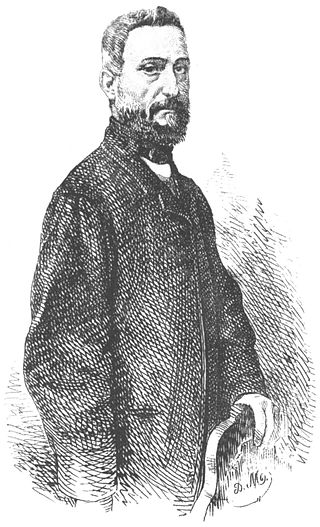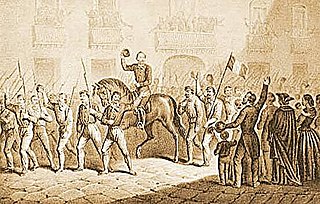
Giuseppe Mazzini was an Italian politician, journalist, and activist for the unification of Italy (Risorgimento) and spearhead of the Italian revolutionary movement. His efforts helped bring about the independent and unified Italy in place of the several separate states, many dominated by foreign powers, that existed until the 19th century. An Italian nationalist in the historical radical tradition and a proponent of a republicanism of social-democratic inspiration, Mazzini helped define the modern European movement for popular democracy in a republican state.

Goffredo Mameli was an Italian patriot, poet, writer and a notable figure in the Risorgimento. He is also the author of the lyrics of "Il Canto degli Italiani", the national anthem of Italy.

The unification of Italy, also known as the Risorgimento, was the 19th century political and social movement that in 1861 resulted in the consolidation of various states of the Italian Peninsula and its outlying isles into a single state, the Kingdom of Italy. Inspired by the rebellions in the 1820s and 1830s against the outcome of the Congress of Vienna, the unification process was precipitated by the Revolutions of 1848, and reached completion in 1871 after the capture of Rome and its designation as the capital of the Kingdom of Italy.

An institutional referendum was held by universal suffrage in the Kingdom of Italy on 2 June 1946, a key event of contemporary Italian history. Until 1946, Italy was a kingdom ruled by the House of Savoy, reigning since the unification of Italy in 1861 and previously rulers of the Kingdom of Sardinia. In 1922, the rise of Benito Mussolini and the creation of the Fascist regime in Italy, which eventually resulted in engaging the country in World War II alongside Nazi Germany, considerably weakened the role of the royal house.

The 1848 Revolutions in the Italian states, part of the wider Revolutions of 1848 in Europe, were organized revolts in the states of the Italian peninsula and Sicily, led by intellectuals and agitators who desired a liberal government. As Italian nationalists they sought to eliminate reactionary Austrian control. During this time, Italy was not a unified country, and was divided into many states, which, in Northern Italy, were ruled directly or indirectly by the Austrian Empire. A desire to be independent from foreign rule, and the conservative leadership of the Austrians, led Italian revolutionaries to stage revolution in order to drive out the Austrians. The revolution was led by the state of the Kingdom of Sardinia. Some uprisings in the Kingdom of Lombardy–Venetia, particularly in Milan, forced the Austrian General Radetzky to retreat to the Quadrilateral fortresses.

The Redshirts, also called the Red coats, are volunteers who followed the Italian patriot Giuseppe Garibaldi during his campaigns. The name derived from the colour of their shirts or loose-fitting blouses that the volunteers, usually called Garibaldini, wore in lieu of a uniform.

Young Italy was an Italian political movement founded in 1831 by Giuseppe Mazzini. After a few months of leaving Italy, in June 1831, Mazzini wrote a letter to King Charles Albert of Sardinia, in which he asked him to unite Italy and lead the nation. A month later, convinced that his demands did not reach the king, he founded the movement in Marseille. It would then spread out to other nations across Europe. The movement's goal was to create a united Italian republic through promoting a general insurrection in the Italian reactionary states and in the lands occupied by the Austrian Empire. Mazzini's belief was that a popular uprising would create a unified Italy. The slogan that defined the movement's aim was "Union, Strength, and Liberty". The phrase could be found in the tricolor Italian flag, which represented the country's unity.

Agostino Depretis was an Italian statesman and politician. He served as Prime Minister of Italy for several stretches between 1876 and 1887, and was leader of the Historical Left parliamentary group for more than a decade. He is the fourth-longest serving Prime Minister in Italian history, after Benito Mussolini, Giovanni Giolitti and Silvio Berlusconi, and at the time of his death he was the longest-served. Depretis is widely considered one of the most powerful and important politicians in Italian history.

The Expedition of the Thousand was an event of the unification of Italy that took place in 1860. A corps of volunteers led by Giuseppe Garibaldi sailed from Quarto al Mare near Genoa and landed in Marsala, Sicily, in order to conquer the Kingdom of the Two Sicilies, ruled by the Spanish House of Bourbon-Two Sicilies. The name of the expedition derives from the initial number of participants, which was around 1,000 people.

Giuseppe Maria Garibaldi was an Italian general, revolutionary and republican. He contributed to Italian unification (Risorgimento) and the creation of the Kingdom of Italy. He is considered to be one of Italy's "fathers of the fatherland", along with Camillo Benso, Count of Cavour, Victor Emmanuel II of Italy and Giuseppe Mazzini. Garibaldi is also known as the "Hero of the Two Worlds" because of his military enterprises in South America and Europe.

Giuseppe Sirtori was an Italian soldier, patriot and politician who fought in the unification of Italy.

Italian nationalism is a movement which believes that the Italians are a nation with a single homogeneous identity, and therefrom seeks to promote the cultural unity of Italy as a country. From an Italian nationalist perspective, Italianness is defined as claiming cultural and ethnic descent from the Latins, an Italic tribe which originally dwelt in Latium and came to dominate the Italian peninsula and much of Europe. Because of that, Italian nationalism has also historically adhered to imperialist theories. The romantic version of such views is known as Italian patriotism, while their integral version is known as Italian fascism.
The Right group, later called Historical Right by historians to distinguish it from the right-wing groups of the 20th century, was an Italian conservative parliamentary group during the second half of the 19th century. After 1876, the Historical Right constituted the Constitutional opposition toward the left governments. It originated in the convergence of the most liberal faction of the moderate right and the moderate wing of the democratic left. The party included men from heterogeneous cultural, class, and ideological backgrounds, ranging from British-American individualist liberalism to Neo-Hegelian liberalism as well as liberal-conservatives, from strict secularists to more religiously-oriented reformists. Few prime ministers after 1852 were party men; instead they accepted support where they could find it, and even the governments of the Historical Right during the 1860s included leftists in some capacity.
The Moderate Party, collectively called Moderates, was an Italian pre-Unification political rally, active during the Risorgimento (1815–1861). The Moderates were never a formal party, but only a movement of liberal-minded reformist patriots, usually secular, from politics, military, literature and philosophy.

Antonio Mordini was a longstanding Italian patriot and, after 1861, a member of the Parliament of the Kingdom of Italy. In 1869 he served as Minister of Public Works of the Kingdom of Italy, a member of the third Menabrea government.
The Italian partisan brigades were armed formations involved in the Italian resistance during the World War II.

Benedetto Musolino was an Italian soldier and politician, who was a member of the Chamber of Deputies of the Kingdom of Italy from 1861 to 1876 and later a member of the Senate of the Kingdom of Italy. Musolino was associated with the Historical Left in Italian politics. A native of Calabria, Musolino was a radical republican and atheist engaged in militant activity against the Kingdom of the Two Sicilies during the Italian unification. In the aftermath of the Revolutions of 1848, he was involved with Giuseppe Mazzini's Roman Republic. Later, he took part in the Expedition of the Thousand under the command of Giuseppe Garibaldi, as the Kingdom of Italy was created through the conquest of the Two Sicilies by the Kingdom of Sardinia.

The Southern Army was the force of around 50,000 Italian and foreign volunteers which formed as a result of the Expedition of the Thousand. The name was coined by Giuseppe Garibaldi.

Giorgio Pallavicino Trivulzio was a Lombard aristocrat who became a long-standing patriot activist-politician. He was consistent in his backing of Italian unification between 1820 and its accomplishment.
Angelo Bassini was an Italian patriot and soldier who served during the unification of Italy, including duty as a colonello (colonel) during the Expedition of the Thousand.














